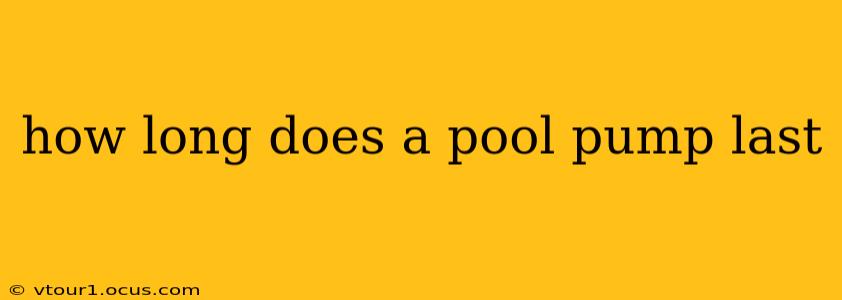Owning a swimming pool is a joy, but maintaining it requires understanding the lifespan of its essential components. One of the most crucial parts of your pool's filtration system is the pump. So, how long does a pool pump last? The answer isn't a simple number, as several factors influence its longevity. This comprehensive guide will explore the average lifespan, factors affecting its longevity, and signs indicating it's time for a replacement.
What is the Average Lifespan of a Pool Pump?
The average lifespan of a pool pump is 8 to 15 years. However, this is just an estimate. Many factors, discussed below, can significantly shorten or extend this lifespan. A well-maintained pump, operating under optimal conditions, can easily surpass the upper end of this range. Conversely, a neglected pump operating in harsh conditions might require replacement much sooner.
What Factors Affect the Lifespan of a Pool Pump?
Several factors contribute to the longevity of your pool pump. Understanding these factors can help you prolong its life and avoid premature failure.
1. Pump Type:
Different types of pool pumps have varying lifespans.
- Single-speed pumps: These are generally less expensive but tend to have shorter lifespans, often falling closer to the lower end of the 8-15 year range.
- Two-speed pumps: Offering more energy efficiency, these typically last longer than single-speed pumps.
- Variable-speed pumps: These are the most energy-efficient and often boast the longest lifespans, potentially exceeding 15 years with proper maintenance.
2. Usage and Run Time:
The more your pump runs, the faster it will wear down. Excessive run times, especially in hot climates, can significantly reduce its lifespan. Regularly running the pump for longer periods than necessary puts extra strain on the motor and components.
3. Water Chemistry:
Poor water chemistry can lead to corrosion and scale buildup within the pump, reducing its efficiency and lifespan. Regularly testing and balancing your pool's water chemistry is crucial for protecting your pump.
4. Maintenance:
Regular maintenance is key to extending the life of your pool pump. This includes:
- Cleaning the pump basket regularly: This prevents debris from clogging the impeller and damaging the motor.
- Inspecting the pump for leaks: Addressing leaks promptly prevents further damage and potential motor burnout.
- Lubricating moving parts: This reduces friction and wear on the pump's components.
- Replacing worn parts: Replacing worn seals or impellers as needed prevents further damage and ensures optimal performance.
5. Environmental Factors:
Extreme temperatures, exposure to the elements (sunlight, rain, etc.), and harsh chemicals can all negatively impact the pump's lifespan. Protecting your pump from the elements as much as possible can help extend its life.
What are the Signs That My Pool Pump Needs Replacing?
Several signs indicate that your pool pump is nearing the end of its life:
- Reduced water flow: Noticeably weaker water flow from the return jets is a clear indication of a failing pump.
- Loud noises: Unusual noises such as humming, grinding, or squealing are warnings of internal problems.
- Frequent overheating: If the motor frequently overheats, it's a sign of reduced efficiency and potential damage.
- Leaks: Any leaks around the pump are a serious issue and require immediate attention.
- Increased energy consumption: If your energy bills have significantly increased despite regular maintenance, it could be a sign of a failing pump.
How Can I Extend the Lifespan of My Pool Pump?
Prolonging the life of your pool pump isn't just about saving money; it's about ensuring consistent pool filtration. Here's how to maximize your pump's lifespan:
- Regular Maintenance: As mentioned earlier, regular cleaning, inspection, and lubrication are crucial.
- Proper Water Chemistry: Maintain balanced water chemistry to prevent corrosion and scale buildup.
- Optimal Run Time: Avoid excessive run times and consider a timer to optimize operation.
- Choose a High-Quality Pump: Investing in a high-quality pump, even if it's more expensive upfront, can save you money in the long run.
- Protect from the Elements: If possible, shield your pump from direct sunlight and harsh weather conditions.
Can I Repair a Pool Pump Instead of Replacing It?
Sometimes, repairing a pool pump is a viable option, especially if the problem is minor, such as a clogged impeller or a worn seal. However, major motor problems or significant internal damage often make replacement more cost-effective. Consult a pool professional to assess the damage and determine the best course of action.
By understanding the factors influencing pool pump lifespan and implementing proper maintenance practices, you can significantly extend the life of your pump, ensuring clear, clean water for years to come. Remember, regular inspections and prompt attention to any issues are key to preventing costly repairs or premature replacements.
